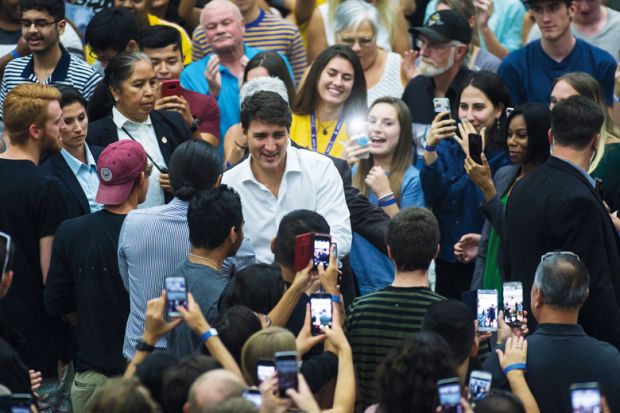Canadian higher education is facing political pressure on multiple fronts as the country heads towards national elections, yet it is regarded by experts as likely to emerge in relatively good shape.
With voting set for October, universities are attracting financial pushback in Ontario, blame for housing shortages in British Columbia and nationwide scrutiny over free speech policies.
Yet experts saw partisan political differences in Canada as largely about how to support academia rather than whether to back it at all, with the current controversies likely to bolster the arguably more pro-education candidacy of the incumbent prime minister, Justin Trudeau.
Mr Trudeau and his Liberal Party are in a tough race with the Conservative Party, headed by Andrew Scheer, said Greg Lyle, president of Innovative Research Group, a leading Canadian polling company.
But Mr Trudeau is encountering far fewer substantive attacks from Mr Scheer, Mr Lyle said, than he is from provincial conservative leaders, led by the premiers of Ontario and Alberta, Doug Ford and Jason Kenney.
For issues affecting higher education, he said, that is especially true in Ontario, where Mr Ford has been hitting institutions with budget cuts and new rules intended to tie future funding to as-yet-undefined performance metrics.
Given the historic public support for higher education nationwide, however, that dynamic could help the Liberals, said Mr Lyle, a former principal secretary of Manitoba. “It’s a chance for Trudeau to say that you need a strong federal government to defend your education” from conservative-led attacks in the provinces, Mr Lyle said.
“The opposition Conservatives are not that scary” on the federal level, he said, “but the provincial conservatives are scary to many people across the country”.
Immigration related to higher education also has the potential to aid the Liberals, said analyst Alex Usher, president of Higher Education Strategy Associates.
While both parties support the idea of foreigners studying at Canadian universities, Mr Usher said, the Conservatives tend to be more sceptical towards refugees. Canada is now taking in about 400,000 immigrants a year.
“The Liberal government might like to make this a polarising election on the question of who likes immigrants more – and betting on the fact that Canadians do,” Mr Usher said.
That strategy could backfire, however, in places such as Vancouver and Toronto, where student-driven growth has help to push housing prices up to the point of unaffordability for many locals. That’s “an opportunity and threat to both parties”, Mr Lyle said.
Attempts by Mr Scheer and Mr Ford to press campuses to accept radical speakers, Mr Usher said, also might get rejected by voters as being less about free speech rights and more about pandering to “outside provocateurs”.
Historically, a Liberal victory should mean somewhat better funding prospects for higher education, especially for research universities, Mr Usher said. The Conservatives, though, are more likely to shift research activity towards applied science and to put more emphasis on colleges and job-specific training programmes, he said.
Given the Conservative Party’s focus on the national budget deficit, however, the pain for higher education under a Scheer administration could be worse than some might expect, Mr Lyle said. “They will not be in a ‘let’s fund new programmes’ mode,” he said. “They’re going to be in a ‘which assistance programmes can we cut?’ mode.”
Register to continue
Why register?
- Registration is free and only takes a moment
- Once registered, you can read 3 articles a month
- Sign up for our newsletter
Subscribe
Or subscribe for unlimited access to:
- Unlimited access to news, views, insights & reviews
- Digital editions
- Digital access to THE’s university and college rankings analysis
Already registered or a current subscriber? Login








